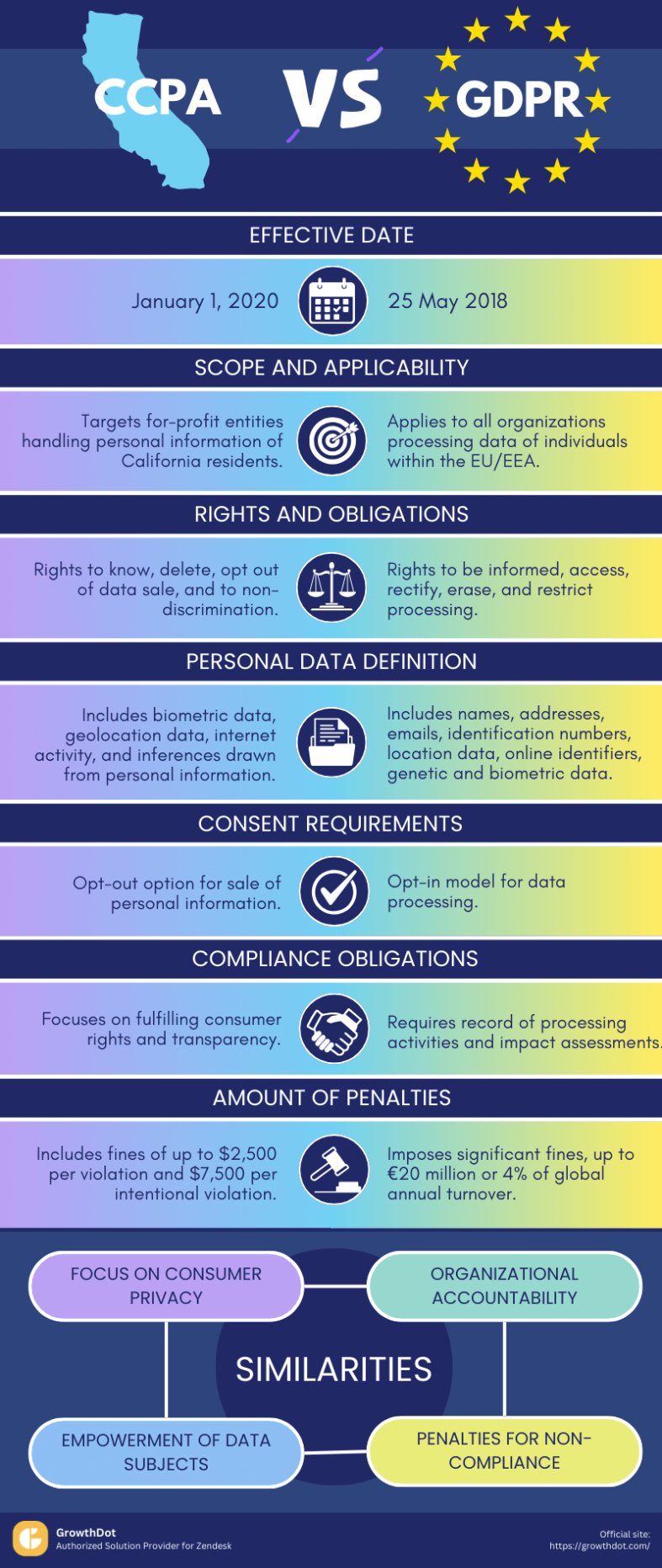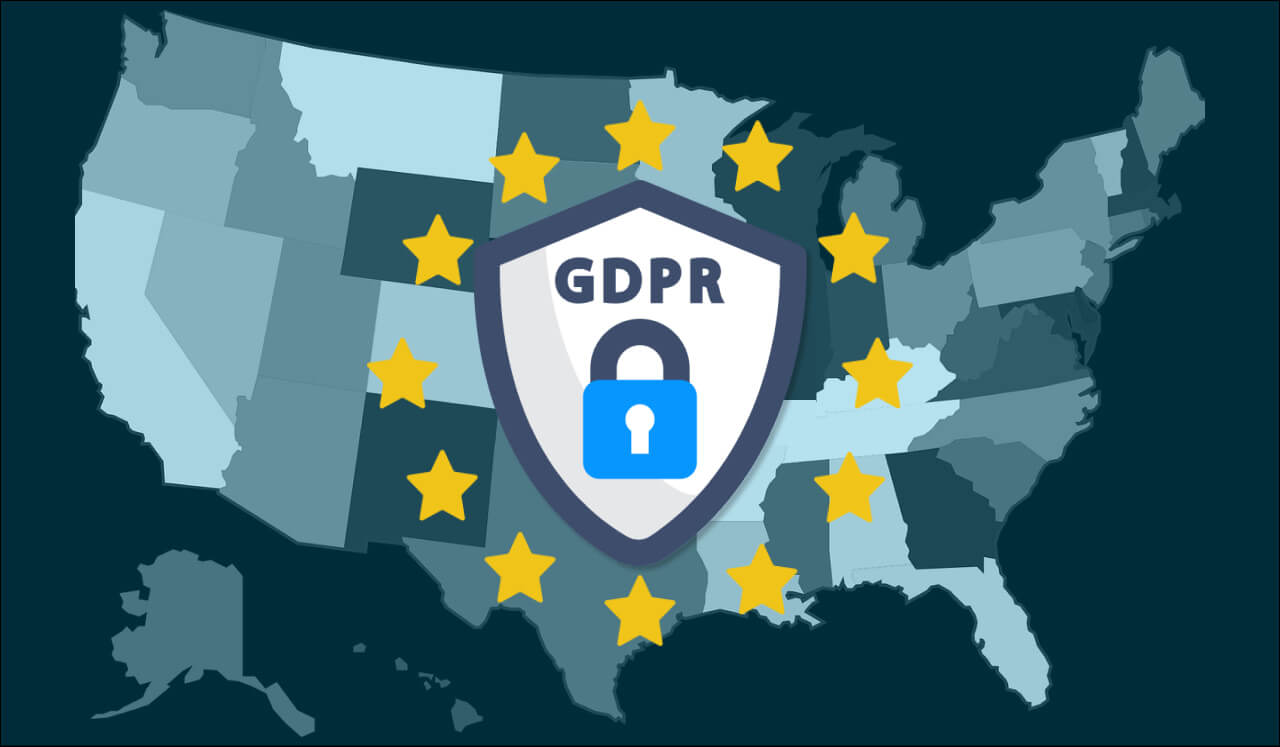The California Consumer Privacy Act (CCPA) and the General Data Protection Regulation (GDPR) set benchmarks for protecting personal data and online privacy. These regulations underscore the growing importance of data privacy in the digital age and the critical need for businesses to understand and comply with their requirements.
As the comparison between CCPA vs GDPR gains attention, professionals need to grasp the main difference between GDPR and CCPA to ensure they align their practices with the relevant legal frameworks. So, let's dive into the comprehensive GDPR vs CCPA comparison.
GDPR and CCPA - Overview
While both GDPR and CCPA aim to safeguard individual's personal data, they do so with some notable distinctions in scope, applicability, and enforcement. By understanding these variances, businesses can tailor their compliance strategies to meet the specific requirements of each regulation, thereby minimizing risks and fostering trust with their customers.
So, we prepared the CCPA vs GDPR infographic below for the visual representation of these two pivotal data privacy regulations.

Now, let's explore each framework in more detail to understand the CCPA vs GDPR differences better.
What is GDPR?
GDPR stands for General Data Protection Regulation, a comprehensive data protection law in the EU that affects entities worldwide. It applies to all organizations that process the data of individuals within the EU and EEA, regardless of the organization's location.
Rights and Obligations:
- GDPR enhances the privacy rights of EU citizens by granting them several crucial rights, such as the right to be informed, access, rectify, erase, and restrict data processing. It also includes rights related to data portability and decisions made via automated processing.
- Organizations are required to inform users about data retention durations, consent withdrawal rights, and data sharing details. They must also provide mechanisms for opting in and out of data processing.
Compliance and Penalties:
- GDPR mandates that organizations implement robust technical and organizational measures to safeguard personal data. This includes data protection by design and default and rapid response protocols in case of data breaches.
- Non-compliance can lead to severe financial penalties, potentially up to €20 million or 4% of annual global turnover, whichever is higher.
This regulatory framework not only sets stringent compliance requirements but also provides a structured approach to data protection, aiming to enhance trust in the evolving digital economy.
What is CCPA?
CCPA stands for California Consumer Privacy Act, which is designed for for-profit entities that handle the personal information of California residents. To fall under CCPA, a business must either have annual gross revenues exceeding $25 million, deal with the personal data of more than 50,000 California residents, households, or devices annually or earn more than half of its annual revenue from selling residents' personal information.
The CCPA empowers California residents with several rights regarding their personal data. These include:
- The right to know about the personal information a business collects about them and how it is used and shared.
- The right to delete personal information held by businesses.
- The right to opt out of the sale of their personal information.
- The right to non-discrimination for exercising their CCPA rights.
Businesses must provide transparent information about data collection practices, the purpose of data collection, and details of third parties with whom the data is shared. They must also implement measures to protect personal information, comply with consumer requests regarding their data rights, and ensure that their service providers adhere to similar standards. For minors under 16, businesses must obtain opt-in consent before data sale, and parental consent is required for those under 13.
The CCPA not only sets a framework for data privacy with its broad definition of personal data but also places significant responsibility on businesses to be transparent and accountable in their data handling practices.
CCPA vs GDPR: Differences
In comparing the California Consumer Privacy Act (CCPA) and the General Data Protection Regulation (GDPR), it becomes apparent that while both regulations aim to safeguard individuals' personal data, they do so through different approaches and with distinct implications for businesses.
So, what is the difference between GDPR and CCPA?
Consent Requirements
GDPR: Mandates an opt-in model where explicit consent is required before any personal data processing occurs.
CCPA: Allows consumers to opt out of selling their personal information.
Geographical Scope
GDPR: It affects any business that processes the personal data of EU residents, regardless of its location.
CCPA: Specifically targets for-profit businesses operating in California that meet certain thresholds, such as annual gross revenues or data processed.
Business Size
GDPR: No exemption based on size, scope, or revenue—applies to large multinational corporations and small businesses if they handle EU residents' data.
CCPA: This law primarily affects larger businesses or those engaged significantly in data transactions as specified by the revenue and data thresholds, potentially exempting smaller companies that do not meet these thresholds.
Industry Impact
GDPR: Encompasses a wide range of industries from technology to healthcare, finance, and beyond, wherever EU data subjects are involved.
CCPA: While also broadly applicable, it notably impacts tech companies, data brokers, and other entities heavily involved in data commerce within California.
Personal Data Definition
GDPR: Defines personal data extremely broadly, encompassing any information related to an identifiable individual. This can include names, email addresses, ID numbers, location data, and online identifiers, among others.
CCPA: Includes additional categories such as biometric data, geolocation data, internet activity (like browsing history), and inferences used to create a profile about a consumer.
Scope of Data Protection
GDPR: Applies to any data that can be used to directly or indirectly identify a person. It mandates that such data must be processed lawfully, fairly, and transparently, providing strong protection across all data types.
CCPA: Focuses more on consumer rights to access and control their personal information, including the right to know about, delete, and opt out of the sale of their personal data.
Data Handling and Consumer Rights
GDPR: Provides individuals with extensive rights over their data, including the right to access, correct, and request the deletion of their data. It also grants rights related to the portability and objection to the processing of personal data.
CCPA: Emphasizes transparency and control over personal information by mandating businesses to disclose data collection and sharing practices and to respond to consumer requests for data access, deletion, and opt-out of data selling.
Compliance Obligations
GDPR: Requires organizations to maintain a record of processing activities and conduct impact assessments under certain conditions.
CCPA: Its obligations focus more on consumer rights fulfillment and transparency in data collection and selling practices.
Penalties for Non-compliance
GDPR: It imposes fines of up to €20 million or 4% of global annual turnover for severe violations.
CCPA: Its fines are also significant but generally lower and issued by the California Attorney General.
CCPA vs GDPR: Similarities
Despite the differences in scope and implementation between the California Consumer Privacy Act (CCPA) and the General Data Protection Regulation (GDPR), these regulations exhibit striking similarities in their overarching objectives, enforcement mechanisms, and implications for businesses and consumers.
Let's explore the common ground between GDPR & CCPA.
Consumer Rights and Organizational Responsibilities
Both the GDPR and CCPA empower consumers with significant rights over their personal data, including the right to access, correct, and delete their information.
Under both laws, organizations must maintain a secure data inventory, respond to consumer requests promptly, and clearly disclose their data privacy policies.
Scope of Applicability
Each regulation applies to entities that collect, use, or share consumer data, whether obtained online or offline.
Both laws extend their reach beyond their immediate geographic boundaries, impacting global businesses that deal with data from EU citizens or California residents
Protection and Penalties
Both laws aim to protect the personal data of individuals, focusing on different regions—GDPR protects EU citizens, while CCPA focuses on California residents.
They share similar frameworks for enforcing compliance, including substantial fines for violations. GDPR can impose penalties up to €20 million or 4% of annual global turnover, whereas CCPA fines can reach up to $2,500 per violation and $7,500 per intentional violation.
How to stay compliant with GDPR and CCPA?
To ensure compliance with GDPR and CCPA, consider using our GDPR Compliance app for Zendesk. This tool streamlines data privacy management processes, including anonymizing, deleting, and retrieving data, helping businesses maintain transparency, respond to consumer requests efficiently, and mitigate compliance risks.
With features tailored to both GDPR and CCPA requirements, the app simplifies compliance efforts, allowing businesses to focus on providing excellent customer service while staying compliant with data privacy regulations.
Summary of CCPA vs GDPR comparison
Through the lens of CCPA versus GDPR, we've navigated the intricate landscapes of data privacy and protection, underscoring the vital distinctions and similarities that businesses worldwide must comprehend.
While CCPA focuses on protecting the privacy rights of California residents and GDPR safeguards the data of European Union citizens, both regulations share common objectives of transparency, accountability, and empowering individuals with control over their personal data.
Recognizing these regulations' broader implications is crucial for legal compliance and as a cornerstone of ethical practice for professionals and businesses.
Moving forward, organizations must remain vigilant in their efforts to comply with these regulations while also adapting to emerging trends and developments in the global data privacy landscape.
CCPA vs GDPR: FAQs
What is GDPR and CCPA compliance?
GDPR (General Data Protection Regulation) and CCPA (California Consumer Privacy Act) compliance refer to the adherence to the respective regulations set forth by the European Union and the state of California to protect individuals' personal data and privacy rights.
How is CCPA different from GDPR?
The CCPA is focused on protecting "personal information," whereas the GDPR is concerned with "personal data." Although both standards share similar aims in terms of security protection, your business will likely need to adhere to both the CCPA and GDPR due to their respective requirements.
What is the US equivalent of the GDPR?
The US GDPR equivalent is often considered the California Consumer Privacy Act (CCPA). While not a federal law like GDPR, CCPA is one of the most comprehensive privacy laws in the United States. It shares similarities with GDPR regarding its focus on individual data privacy rights, transparency, and accountability for businesses handling personal information. However, it's worth noting that CCPA is specific to California and applies to companies that meet certain criteria. In contrast, GDPR applies across all EU member states and to any organization processing the personal data of individuals residing in the EU, regardless of the organization's location.








